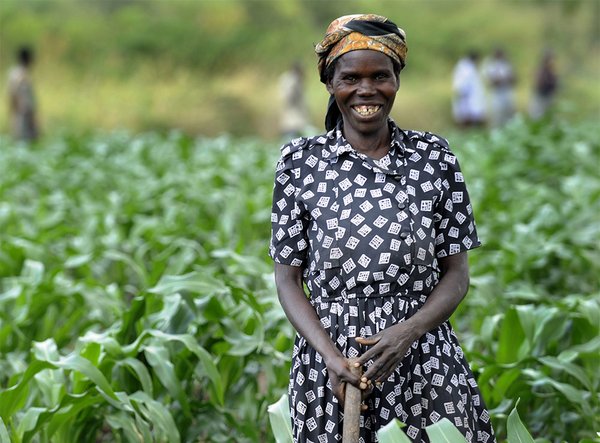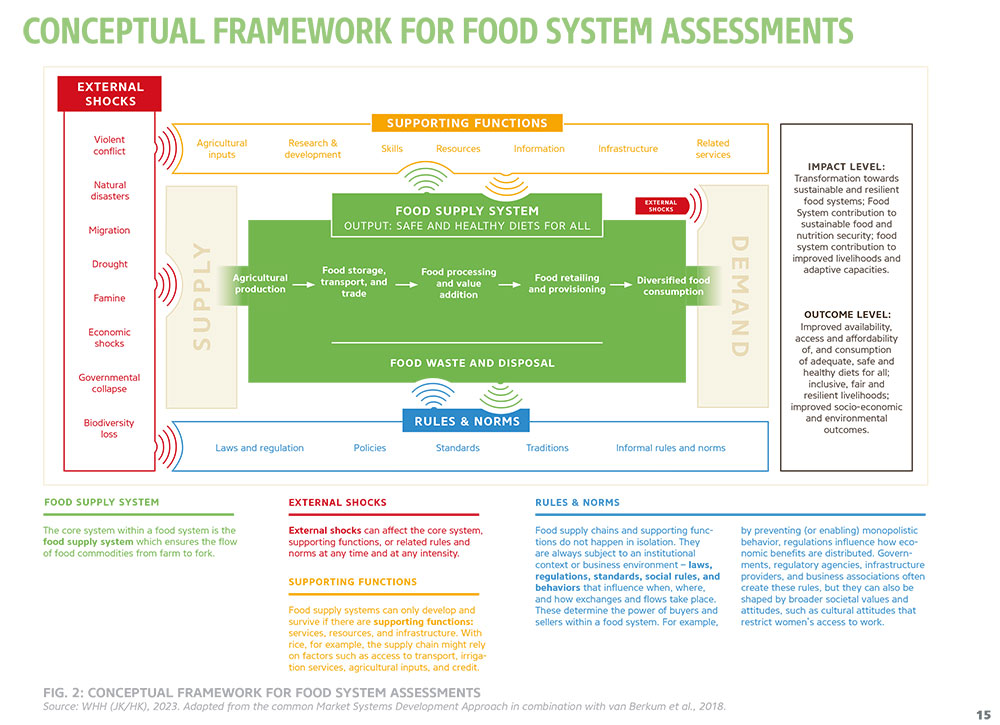 Download this article in magazine layout
Download this article in magazine layout
- Share this article
- Subscribe to our newsletter
Welthungerhilfe’s food system framework – a compass for practitioners
Working towards sustainable and resilient food systems is not a new agenda for development actors. And yet, the question of how to address the complexity of systemic transformation processes to contribute to sustainability and resilience is still challenging, especially at local level. Drawing from its years of experience in working with systemic approaches – across sectors such as agriculture, natural resources management, water, sanitation and hygiene (WASH), market systems development (MSD), multi-actor partnerships (MAP) and integrated food and nutrition security programmes – Welthungerhilfe has developed a framework to unfold the complexity of food systems into manageable parts for systemic transformation. It consists of six phases which can be adapted to context-specific needs, potentials and challenges and guide development strategies, programmes and projects:
PHASE 1 – Scoping: Explore to what end and for whom transformation is needed. Map out with whom food system transformation needs to happen. Practitioners have diverse entry and leverage points to work on and to transform food systems. Entry points depend on the local, regional or global context and on the primary purpose which is being pursued to achieve transformation (i. e. environmental sustainability, climate resilience, inclusivity, availability and affordability of nutritious food, etc.). It is therefore crucial to be clear on the pursued aim for food systems transformation as concepts, approaches, system assessment tools and, most importantly, the motivation for change across system actors can differ depending on the envisioned change and context-specific needs.
PHASE 2 – Diagnosing: Assess how the system is (mal-) functioning by mapping out the current status of system outputs, performance, behaviour and characteristics. In a second step, zoom into key variables of a food system: Which leverage points can help to improve a system’s performance towards the defined ambition for transformation? This phase focuses on deep dive assessments to outline system performances with respect to e.g. food and nutrition security, resilience, and sustainability. For this purpose, Welthungerhilfe has developed a conceptual framework for food system assessments setting out from the central part of a food system – the food supply system (see Figure).
PHASE 3 – Visioning: Jointly validate and refine the scope of the transformation that emerged from the scoping and diagnosis phases. Work on a joint vision for food system transformation across system actors and define transformation pathways. During the visioning phase, we reflect on the findings of assessments with the affected stakeholders. Within WHH’s strategic programming, this step is also used to define future programming by outlining the degree of interventions that already contribute to food systems transformation and by highlighting gaps to design long-term solution pathways for sustainable development.
PHASE 4 – Designing: Identify approaches to transform the key levers, formulate a theory of change and broker a commitment to act. In the design phase, we collaboratively develop a local action plan of how a transformation should happen in a systematic way and what our role and our partners’ role will be at the programme and project levels. It is a phase where informed decision-making is taking place and results chains are designed to monitor change against transformation process targets and whether a transformation results in changes at the outcome level.
As we work in diverse settings within one country, system needs and local transformation strategies are context-specifically designed. In concert with our partners, we differentiate the roles in our engagement accordingly. As a facilitator, we coordinate systemic multi-stakeholder action at regional, national or local level in accordance with national food system transformation commitments and context-specific system needs. As a contributor, we are part of a transformation process that is facilitated by other actors. In coordination with these, we focus on a combination of interventions that pursue systemic change of a specific key variable (also called leverage points) within the food system. As an implementer, we address immediate system needs to prevent a partial or complete collapse e.g. of the local food market system.
PHASE 5 – Transforming: Break down the project design and theory of change into interventions or activity packages and design interventions with a systems lens. Food system transformation needs agile programme management. Prototyping and iterating interventions on a small scale should be considered before implementing them on a large scale. This may involve refining the theory of change, results chain and/or logframe.
To classify the contribution of interventions towards systemic change, WHH has developed a systems marker with which interventions can be classified as uninformed (reinforcing existing system characteristics, i.e. promotion of monocultures), system responsive (addressing system gaps, i.e. supporting the seed market) and system transformative (engaging in multi-stakeholder processes for long-term system transformation). The systems marker can also indicate the level of fragility to shocks and stresses that a specific key variable in a food system or even the whole system faces.
Especially in fragile contexts, WHH pursues a complementary systemic approach that covers interventions which would fall under all three categories. First, the immediate food and nutrition security needs of acutely food-insecure populations in fragile contexts must be addressed. Once local capacities are available, long-term change should be driven by local system actors with the aim to reduce fragility in the long run while contributing to improved food and nutrition security.
PHASE 6 – Measuring, changing and adapting: Monitor system status change and evaluate system trajectory change, evaluate system change contributions, collaborate, learn and adapt. Food system transformation is an iterative and continuous process in which it is key to monitor intended and unintended changes of system outcomes as well as structural changes, and evaluate whether and how a project or programme contributes to system trajectory changes. Together with system stakeholders, it is recommended to foster a learning culture, to develop and implement learning plans where appropriate, and to reflect on results and learnings, and adapt the design and implementation of the transformation process to local needs.
Unfolding multi-level and multi-actor potential for enduring systemic change
Virtually all food system indicators show negative trends and require substantial transformation (food security, climate, biodiversity, equality). Still, the current discourse is largely dominated by academia and policy, but far less by practitioner experience. We are convinced that it is essential for system actors to collaboratively define the scope for transformation, to break down the complexity of food systems transformation into manageable parts and to identify key leverage points to improve the performance of a food system. Hence, we need systemic approaches, especially those that unfold multi-level and multi-actor potential for enduring systemic change.
At first sight, working on these change processes can be an overwhelming task at operational level as multiple effects need to be taken into consideration to outline what is influencing the performance, behaviours and characteristics of food system key variables towards system transformation. WHH has consulted with staff, partners and its advisory committee to what extent a food system status report, a problem analysis and a solution analysis are needed to work on food systems transformation. All types of assessments are relevant.
At the same time, we will primarily invest resources to assess potentials to unlock the opportunities of a sustainable and resilient food system to foster safe and healthy diets for all. Development practitioners hardly have the resources needed to conduct multi-annual food systems analyses as implemented by research agencies. This is a sphere of excellence on its own. Development actors should use the outputs of these studies (if available) complementary to their solution analysis to define a manageable multi-stakeholder systems approach towards long-term transformation.
Systemic approaches can challenge the input-output-oriented approaches in development cooperation. To achieve a status change, both approaches have to go hand in hand. Especially in fragile and crisis-affected contexts we must acknowledge that system gaps exist and need to be addressed (often immediately) through direct input support in order to prevent a full system collapse. It is important to design these short-term interventions in ways that they contribute to both short-term (intermediate) improvements and long-term systemic change. Therefore, it has to be clearly defined for and with whom and to what end transformation is to be performed in which timeframe.
It is equally important to understand and design one’s own role in a system. Facilitating systemic change processes is a profession on its own. It asks development practitioners to be facilitators rather than implementers – sometimes even both. Investing in these skills is essential if we aim to unfold the potentials in the system itself through multi-stakeholder commitment for local change. The number of people without sufficient food is on the rise, and we have to increase the resilience of food systems urgently as climate change, natural resource depletion and conflicts are globally threatening our food systems.
Jasmin Koottummel works as Senior Advisor, Food Systems and Economic Development, at Deutsche Welthungerhilfe (WHH) in Bonn, Germany.
Hendrik Hänke is WHH Senior Advisor, Agriculture and Natural Resource Management.
Tereza Kaplan is WHH Senior Advisor, Impact and System Evaluation.
Contact: jasmin.koottummel@welthungerhilfe.de
References and further reading:
Hänke H., Bratz A., Griebel S., Koottummel J., Verkuijl H. (2023): Food systems transformation in fragile contexts, a practitioner’s perspective. In: Frontiers. Sustainable Food Systems.
Rockström, J., Gupta, J., Qin, D. et al. (2023): Safe and just Earth system boundaries. Nature 619, 102–111. https://doi.org/10.1038/s41586-023-06083-8
van Berkum, S., Dengerink, J., & Ruben, R. (2018). The Food Systems Approach: Sustainable solutions for a sufficient supply of healthy food. Wageningen: Wageningen Economic Research.






Add a comment
Be the First to Comment